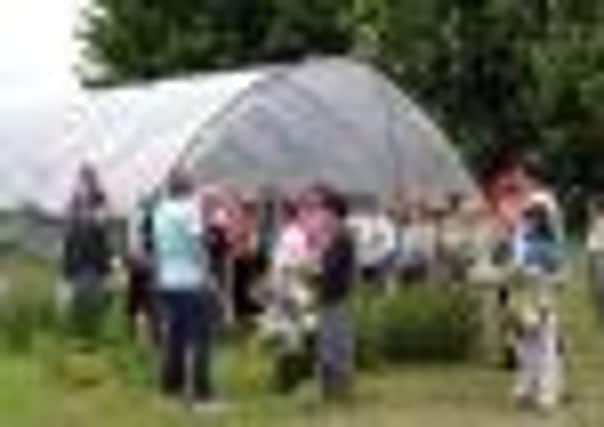Cutting off the roots of learning


For almost a decade, the Stockbridge Technology Centre, near Selby, has played host to thousands of children from local schools every year.
Last year, more than 2,000 came, and Graham Ward, the chief executive sees it as vital work.“They have their own patch of ground, like an allotment,” he says.
Advertisement
Hide AdAdvertisement
Hide Ad“We ploughed it and cultivated it for them and they came and planted things, like Iceberg lettuce, and covered it with sheets. They came again six weeks later and, in September, they harvested different things. It is part of our ‘Reconnection Agenda’, trying to expose schoolchildren to vegetable growing and healthy eating, because we give them cookery classes as well
“They get to touch the stuff, they get to smell a fresh carrot – they’ve never smelt a fresh carrot in their lives. They think they are manufactured in Tescos’ cellars. It’s about how plants grow and about nutrition, and how they use their hands and dexterity. It’s also about introducing kids to horticulture as a possible career.”
Stockbridge is paid £100 for every visit from those groups under the Countryside Stewardship Scheme (CSS), plus an annual £500 payment for opening its doors to schools in the first place.
The money is used to help pay for the buses which bring pupils from urban areas out to Stockbridge.
Advertisement
Hide AdAdvertisement
Hide AdBut the CSS is being replaced by the Higher Level Stewardship Scheme (HLS). And the Government has ruled that new entrants onto that scheme will no longer be eligible for funding for farm visits. Stockbridge will go onto the new scheme in two years’ time.
“It’s not the damage to our business that’s the problem,” says Graham Ward. “It’s the fact that these schools will no longer have any help to bring their children to us.”
Bill Graham from the charity Farm and Countryside Education estimates 100 farms a year could lose their funding for school visits over the next 10 years.
“In this country, most young people are six generations away from farming so there is a distancing in young people’s understanding of where food comes from, which needs to be redressed,” he says.
Advertisement
Hide AdAdvertisement
Hide AdYorkshire farmer Carl Clayton is another who will lose out. He has built his farm visits up to 43 a year. He also visits schools to give talks and help children learn practical skills, such as building nest-boxes. He also has groups who come to his farm, near Ulleskelf, outside York.
“I get paid approximately £80 for a day’s visit,” he says. “I have to either employ somebody else to do my day’s work when I have a school visit, or I have to do the time elsewhere. I have extra insurance to pay, it’s not just the children arriving at half-past nine and leaving at half-past two. You’ve got to prepare for things such as wet days when there’s more time involved”
He says that the school visits aren’t about making money, but about what it gives the children, and the farming industry.
“We have a mixed arable farm. We have machinery; I’m what you could call a very hands-on person. I do let the children stroke the animals.
Advertisement
Hide AdAdvertisement
Hide Ad“I wouldn’t let the children climb on the machinery without me being there, but they can climb into a tractor ‘supervised’ and into the combine harvester ‘supervised’. Last year, I talked to about 2,500 children, which is good publicity for British farming.”
One of the biggest worries is that years of experience of connecting the young with the countryside could be lost.
“There will be a significant number affected,” says Laurie Norris, the environment and land use adviser for the National Farmers Union North-East region.
“But it’s not the numbers that count, it’s the quality that will be lost. If they’re in Countryside Stewardship, they’ll have been in for 10 years or so, so they’ll be fairly well established and they will have built up to a significant number of people visiting their farms for educational purposes. So I think it will be a lot of the quality ones that will be lost.”
Advertisement
Hide AdAdvertisement
Hide AdBill Graham, of Farm and Countryside Education, believes that the way food is produced and consumed, as well as the future management of the countryside, could be seriously undermined by these cuts.
“At the end of the day, young people are going to be the consumers and the voters of the future. They learn how the countryside is going to be managed in the future. If people don’t actually understand anything about it, how are the decisions going to be made in an informed way?”
In reponse, the Department for the Environment Food and Rural Affairs said in a statement: “The removal of annual access payments was one of the hard choices that we had to make as part of the recent Spending Review, when we had to look very closely at how best to maximise the funding we receive from the EU for HLS.”
Defra says that the savings made from access payment will protect other aspects of the their bio-diversity and environmental programmes.
Advertisement
Hide AdAdvertisement
Hide AdWhat particularly annoys Graham Ward is that by his estimate, the Government will save only about a third of a million pounds a year, which he sees as a tiny sum when set against the long-term benefits farm visits can bring to the country.
“I think it’s a mean-minded saving. I know we’re in financial difficulties, but when the whole scheme between now and 2020 is going to cost less than one banker’s bonus, it’s a bit askew in one’s priorities for life.”